Malleable – a superpower all children possess
Meet Mateo. His superpower is being malleable.
Malleable – adjective
According to Merriam-Webster, malleable is an adjective that indicates when a person is capable of being altered or controlled by outside forces or influences. Or, simply put, having capacity for adaptive change.
Are children more malleable than adults?
The older we become, the more set in our ways we can be. Plus, adult brains are fully developed. While adults can still learn new concepts and change or adapt to new situations, children are truly sponges soaking up concepts through experiences … because they are most malleable at a young age.
This is good news for parents who may be caring for children who have experienced adverse childhood experiences (ACE). While trauma is not something one forgets, it is something a child can learn to heal from and process.
How is malleability a superpower in children?
Young, carefree and impressionable children may not even realize how adaptable they are in childhood, especially children impacted by an ACE. Malleability is a true superpower because vulnerable children served by Buckner may have experienced more adversity in a short life span compared to adults who have lived full lifetimes.
Children who have experienced loss, trauma or other family adversity have little choice but to be malleable. The good news is with safe and loving families and support to adjust through the changing seasons, children can grow up strong and confident because of their malleable potential.
What do child experts say about malleability?
We asked some of our internal staff who work with vulnerable children through different Buckner International programs what they think about malleability and how children possess that as a superpower.
Bekah – Director, Foster Youth Aging Out Program, Lubbock, Texas
Youth in foster care and former foster youth are the epitome of malleability. They are experts at adapting and flexing to their situations.
The teenage and early adult years are also peak times of brain development, and youth are capable of learning new things every day, whether that is coping skills and strategies to meet their mental health needs or how to do things like write a check, pay a bill or even drive a car. Teens and young adults are like sponges, willing to soak up anything anyone is willing to pour into them.
Cassandra – Director, Buckner Family Hope Center at Reed Road in Houston, Texas
Children in families with a lack of resources or limited to no support system can be challenged to adapt during stressful and adverse situations. Oftentimes children are faced with these challenges because they are a part of a single-parent home, and the parent is not available to receive the resources that may exist due to work commitments.
Some families have a distant relationship with their immediate family and this in turn causes strain on the parent and the child. I have witnessed some of these families forming their own support groups within their community. This is a strength and malleability that shows they are determined to overcome the challenges facing their child’s future success.
Dior – Director of Administration and Operations, Houston, Texas
For many of the children we work with, they are used to adapting to hard situations continuously. What and how much food they have, where they are living, what resources they have access to, and even what schools they attend – They have no control over many of those situations and must accept and adapt to it.
Children are as flexible and malleable as we allow them to be. They inherently are open to new situations, if adults embrace the opportunity and present it as an inviting and exciting opportunity.
Parents should model the behavior they want to see in their children. If a parent is open, their children will be open to new situations that present themselves. It is important that adults control reactions when plans change at the last minute and embrace it, as our children are watching how we handle such situations. If we do not make it a big deal, then it ceases to become an issue for us and our children.
Five tips to nurture a child’s malleability following an adverse childhood experience
- Be patient. Processing trauma and beginning to heal can take time.
- Seek to understand through listening but avoid saying you understand. Even if you had a similar adverse childhood experience in your childhood, no two experiences are the same, and no one feels or reacts quite the same. Realistically, we will never know exactly how a child felt during or feels after a traumatic experience. Listening to understand, rather than to respond, will build rapport and trust.
- Be consistent. Follow through with what you say you’re going to do.
- Be honest about being human. If you make a mistake, it’s OK for an adult to say, “I messed up.” Children need to know perfection can be an aspiration but not an expectation.
- Meet the child wherever they are at right now. Something may trigger a memory you weren’t expecting and it can feel like a setback. Take a deep breath and support your child while they process the situation. Expect the road ahead to be bumpy at times, but know you are still helping your child move forward.




Comments